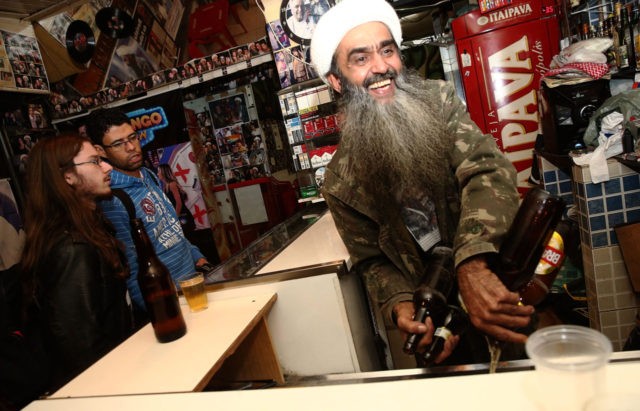Brazil’s O Globo has revisited Rio de Janeiro’s “Bin Laden Bar,” an establishment first made famous when foreigners discovered it during the 2014 World Cup. The bar is a hit with Olympic athletes, who find its “local flavor” superior to the allegedly insipid Olympic Village.
The Bar do Bin Laden, one of a series of Bin Laden-themed bars that took the city by storm in 2014, is the creation of José Felipe de Araújo. His is the most centrally-located establishment for the Olympics, bringing tourists by the dozens to take photos with him – his resemblance to Osama bin Laden the basis for the bar’s name – and enjoy the signature drink caipirinha.
“I have nothing to complain about – I’m right at the heart of the Games,” he tells O Globo. He notes that the only challenge of hosting Olympians is that he does not speak the same language as most, but they get over it. “To make a request, they point, I point, and all is well,” he notes. “I have no schooling, but I always learn from them.”
Even American tourists are enjoying the bar. Among those quoted is Olympic gymnastics coach Kim Tanskanen. “Bin Laden is dead. What matters is that the service is great,” she notes. She adds that caipirinhas are “very sweet.”
In 2014, when Brazil hosted the FIFA World Cup, Rio de Janeiro’s Bin Laden-themed bars – most owned by bearded impersonators – became a source of international curiosity. At the time, Francisco Elder Braga Fernandes was the proprietor of “Bar do Bin Laden.” He told Vocativ his resemblance to the late Al Qaeda terrorist “was great for business.” His competitors, with names like “Bin Laden’s Cave,” also did well with foreigners.
Fernandes opened his bar before the fated Navy SEAL siege in Pakistan, following his interactions with police. His neighbors, he said, had reported him to authorities, believing that the real Osama bin Laden had fled to Brazil. The police took photos with him once they confirmed he was not, in fact, Osama bin Laden. The Bin Laden craze placed the U.S. soccer team alarmingly close to a jihadi-themed bar at the time.
Threats of Islamic terrorism at the Rio de Janeiro Summer Olympics has not hurt business for Araujo’s bar. For months, Islamic State radicals have been threatening to bomb Rio’s Olympic village. Shortly before the games, a group calling itself Ansar al-Khalifah Brasil became the first such group to pledge allegiance to ISIS caliph Abu Bakr al-Baghdadi in Latin America. Portuguese-language Islamic State propaganda began to surface on social media, and at least 13 Brazilians have been arrested for plotting to attack the Olympic Games. Brazilian authorities are probing a second terrorist ring, revealed by an undercover investigation by a Globo TV journalist.
Brazil has historically not had a record of Islamic terrorism, though its more remote locations have become a hub for jihadist activity. The Shiite terrorist group Hezbollah in particular has become active in a region known as the “tri-border area,” which connects Brazil to Paraguay and Argentina. Hezbollah operatives use the region to launder drug money or transport drugs sold to fund jihadist activists around the world. Earlier this month, a man arrested for drug trafficking admitted to police, who appeared not to have any evidence indicating this, that he was a Hezbollah operative involved in drug trafficking to fund jihad.
Hezbollah and the Islamic State are rival groups, raising concerns that their conflict will expand to acts of reprisal within Brazil.

COMMENTS
Please let us know if you're having issues with commenting.